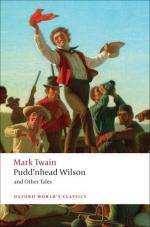There was a murmur of applause at the conductor’s compact reasoning, and it gave him pleasure—you could see it in his face. But the Major was not disturbed. He said:
’There—now you have touched upon a crying defect in the complaint system. The railway officials—as the public think and as you also seem to think—are not aware that there are any insults except spoken ones. So nobody goes to headquarters and reports insults of manner, insults of gesture, look, and so forth; and yet these are sometimes harder to bear than any words. They are bitter hard to bear because there is nothing tangible to take hold of; and the insulter can always say, if called before the railway officials, that he never dreamed of intending any offence. It seems to me that the officials ought to specially and urgently request the public to report unworded affronts and incivilities.’
The conductor laughed, and said:
‘Well, that would be trimming it pretty fine, sure!’
’But not too fine, I think. I will report this matter at New Haven, and I have an idea that I’ll be thanked for it.’
The conductor’s face lost something of its complacency; in fact, it settled to a quite sober cast as the owner of it moved away. I said:
‘You are not really going to bother with that trifle, are you?’
’It isn’t a trifle. Such things ought always to be reported. It is a public duty and no citizen has a right to shirk it. But I sha’n’t’ have to report this case.’
‘Why?’
‘It won’t be necessary. Diplomacy will do the business. You’ll see.’
Presently the conductor came on his rounds again, and when he reached the Major he leaned over and said:
’That’s all right. You needn’t report him. He’s responsible to me, and if he does it again I’ll give him a talking to.’
The Major’s response was cordial:
’Now that is what I like! You mustn’t think that I was moved by any vengeful spirit, for that wasn’t the case. It was duty—just a sense of duty, that was all. My brother-in-law is one of the directors of the road, and when he learns that you are going to reason with your brakeman the very next time he brutally insults an unoffending old man it will please him, you may be sure of that.’
The conductor did not look as joyous as one might have thought he would, but on the contrary looked sickly and uncomfortable. He stood around a little; then said:
‘I think something ought to be done to him now. I’ll discharge him.’
’Discharge him! What good would that do? Don’t you think it would be better wisdom to teach him better ways and keep him?’
‘Well, there’s something in that. What would you suggest?’
’He insulted the old gentleman in presence of all these people. How would it do to have him come and apologise in their presence?’
’I’ll have him here right off. And I want to say this: If people would do as you’ve done, and report such things to me instead of keeping mum and going off and blackguarding the road, you’d see a different state of things pretty soon. I’m much obliged to you.’




